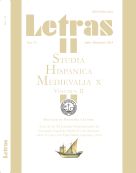“Et avié una viña rica, de mejor non nos cala”: Representation of Porus’s Palace and its Golden Vineyard in the Libro de Alexandre, Intertextuality and Literary Functions
Keywords:
Libro de Alexandre, Ekphrasis, Descriptio, Porus, Mirabilia, East, Artificial Vineyard, Roman d’Eneas, MandevilleAbstract
According to what is told in the Libro de Alexandre, after the death of Darious III, Alexander the Great starts his exploration to the deep East, in search of Porus, the Indian satrap. When the hero arrives at the Palace of this governor, he fortunately finds a series of objects that can easily be included in a catalogue of mechanical and artificial marvels. Among these objects, we can find a special vineyard made of gold and precious stones, which is located in the gardens of the superb palace. This essay tries to unveil certain literary functions contained in this episode. At the same time, I intend to prove that the literary representation of a vineyard is a common motif in the description of oriental palaces in medieval works. Such is the case of the Historia de Proellis, the Roman d’Aeneas and other texts that are formally included in the tradition of récits de voyage.Downloads
Download data is not yet available.
Downloads
Published
2019-04-22
How to Cite
Altamirano Meza, G. R. (2019). “Et avié una viña rica, de mejor non nos cala”: Representation of Porus’s Palace and its Golden Vineyard in the Libro de Alexandre, Intertextuality and Literary Functions. Letras, 2(72), 65–78. Retrieved from http://200.16.86.39/index.php/LET/article/view/1772
Issue
Section
Ponencias. Estudios de literatura española medieval
License












